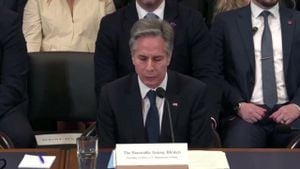Singapore has recently been embroiled in significant allegations of money laundering, with the situation drawing attention to serious lapses within the financial system. The roots of this scandal point back to actions taken by bank employees, extravagant lifestyles, and international fugitives escaping justice.
At the center of this storm is Wang Qiming, formerly a banking relationship manager at Citibank. He has been implicated for his part in what has been described as Singapore's largest money laundering case. According to reports, Wang is set to plead guilty to ten charges, including serious offenses like money laundering and forgery, which he facilitated during his tenure at the bank. His actions allegedly help facilitate transactions for clients who later found themselves convicted of money laundering.
The case came to light on August 15, 2023, when authorities conducted simultaneous raids at luxury properties across Singapore as part of a broader investigation. This uncovered approximately $3 billion worth of assets and cash linked to money laundering activities, including luxury items such as jewelry and cars.
Specifically, Wang's clients included two of the ten convicted money launderers, identified as Su Baolin and Vang Shuiming. Prosecutors allege Wang assisted Su by creating false loan agreements intended to deceive another bank, Standard Chartered Bank, concerning the source of funds. He also faces charges for possessing cash tied to Su's criminal activities—money he currently cannot validly explain.
Wang is not alone, as investigations have revealed ties to several suspects who have evaded arrest. Notably, 17 individuals believed to be connected to the operation fled Singapore around the time of the investigations. Police have indicated some of these fugitives later had substantial assets of around $1.85 billion surrendered to the state as the investigation progressed.
The Singapore Police Force's approach has led to discussions about its effectiveness. The police have stated they did not arrest one key fugitive, Yan Zhenxing, who was wanted on Interpol's Red Notice. Yan was detained by Indonesian authorities after entering the country. The police explained they lacked sufficient evidence to take action against him prior to his departure. They clarifying at the time of Yan's residency approval, no active notices were against him.
The ramifications of the $3 billion scandal extend beyond individual accountability. There is mounting pressure for the financial sector to re-examine its regulatory practices, considering how deep-rooted this scheme became without detection.
On December 11, 2024, Wang's involvement continues as he returns to court, where the state could impose significant penalties depending on the outcomes of his plea. This case will not only impact those directly involved but may also shape Singapore's future financial regulations and practices.
Meanwhile, Liew Yik Kit, who was affiliated with the operations involving another fugitive connected to the laundering case, will also stand trial soon, facing serious charges of obstruction and falsifying police information. This type of accountability is expected, as authorities work to dismantle the broader network of money laundering connections.
Singapore's authorities, known for their stringent laws against financial crimes, are now under scrutiny for how such significant fraudulent activities could flourish within their financial ecosystem. Already, the reputation of the country's banking institution is at stake, and the upcoming court proceedings will likely shed more light on the wider impact of this scandal.
Public sentiment has also shifted, increasing concerns about the influence of foreign nationals within Singapore’s financial sector and the vulnerabilities present. With this serious breach of public trust, there is now greater demand for transparency and accountability in how investigations are conducted and how the institutions involved are regulated.
This situation is far from resolved, but it serves as both a warning and call to action for Singaporean regulators who must now address both current issues and future risks to maintain integrity within their financial systems.
It will be interesting to observe the forthcoming trials and the potential for systemic reform. These cases highlight the necessity of rigorous oversight to prevent similar occurrences. The country’s pathway forward may depend heavily on how it processes this multifaceted investigation and the repercussions it enacts as the events continue to unravel.



